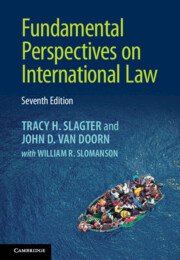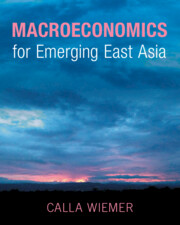Refine search
Actions for selected content:
36809 results in Cambridge Textbooks

Fundamental Perspectives on International Law
-
- Published online:
- 23 November 2022
- Print publication:
- 15 December 2022
-
- Textbook
- Export citation

Macroeconomics for Emerging East Asia
-
- Published online:
- 18 November 2022
- Print publication:
- 01 December 2022
-
- Textbook
- Export citation
6 - Statistical Mechanics
- from II - Mathematical Tools of Complexity Science
-
- Book:
- Complexity Science
- Published online:
- 13 December 2022
- Print publication:
- 17 November 2022, pp 110-162
-
- Chapter
- Export citation
Copyright page
-
- Book:
- History and Systems of Psychology
- Published online:
- 04 November 2022
- Print publication:
- 17 November 2022, pp iv-iv
-
- Chapter
- Export citation
9 - Mental Passivity: The British Tradition
- from Part I - Psychology’s Historical Foundations
-
- Book:
- History and Systems of Psychology
- Published online:
- 04 November 2022
- Print publication:
- 17 November 2022, pp 164-183
-
- Chapter
- Export citation
13 - Tipping Points, Transitions and Forecasting
- from II - Mathematical Tools of Complexity Science
-
- Book:
- Complexity Science
- Published online:
- 13 December 2022
- Print publication:
- 17 November 2022, pp 387-396
-
- Chapter
- Export citation
Detailed Contents
-
- Book:
- History and Systems of Psychology
- Published online:
- 04 November 2022
- Print publication:
- 17 November 2022, pp ix-xviii
-
- Chapter
- Export citation
9 - Information Theory and Entropy
- from II - Mathematical Tools of Complexity Science
-
- Book:
- Complexity Science
- Published online:
- 13 December 2022
- Print publication:
- 17 November 2022, pp 230-278
-
- Chapter
- Export citation
4 - Classical Rome to the Early Middle Ages
- from Part I - Psychology’s Historical Foundations
-
- Book:
- History and Systems of Psychology
- Published online:
- 04 November 2022
- Print publication:
- 17 November 2022, pp 59-86
-
- Chapter
- Export citation
II - Mathematical Tools of Complexity Science
-
- Book:
- Complexity Science
- Published online:
- 13 December 2022
- Print publication:
- 17 November 2022, pp 87-400
-
- Chapter
- Export citation
10 - Mental Activity: The German Tradition
- from Part I - Psychology’s Historical Foundations
-
- Book:
- History and Systems of Psychology
- Published online:
- 04 November 2022
- Print publication:
- 17 November 2022, pp 184-201
-
- Chapter
- Export citation
Iliad Book 18
-
- Book:
- Reading Homer
- Print publication:
- 17 November 2022, pp 97-97
-
- Chapter
- Export citation
Grammar Index
-
- Book:
- Reading Homer
- Print publication:
- 17 November 2022, pp 193-194
-
- Chapter
- Export citation
Iliad Book 18
- from Iliad Book 18
-
- Book:
- Reading Homer
- Print publication:
- 17 November 2022, pp 98-161
-
- Chapter
- Export citation
8 - Sensationalism and Positivism: The French Tradition
- from Part I - Psychology’s Historical Foundations
-
- Book:
- History and Systems of Psychology
- Published online:
- 04 November 2022
- Print publication:
- 17 November 2022, pp 147-163
-
- Chapter
- Export citation
11 - Agent-Based Modelling
- from II - Mathematical Tools of Complexity Science
-
- Book:
- Complexity Science
- Published online:
- 13 December 2022
- Print publication:
- 17 November 2022, pp 324-355
-
- Chapter
- Export citation
Select bibliography
-
- Book:
- Reading Homer
- Print publication:
- 17 November 2022, pp 14-16
-
- Chapter
- Export citation
10 - Stochastic Dynamics and Equations for the Probabilities
- from II - Mathematical Tools of Complexity Science
-
- Book:
- Complexity Science
- Published online:
- 13 December 2022
- Print publication:
- 17 November 2022, pp 279-323
-
- Chapter
- Export citation
14 - American Functionalism
- from Part II - Systems of Psychology
-
- Book:
- History and Systems of Psychology
- Published online:
- 04 November 2022
- Print publication:
- 17 November 2022, pp 267-300
-
- Chapter
- Export citation
Iliad Book 16
- from Iliad Book 16
-
- Book:
- Reading Homer
- Print publication:
- 17 November 2022, pp 18-96
-
- Chapter
- Export citation
